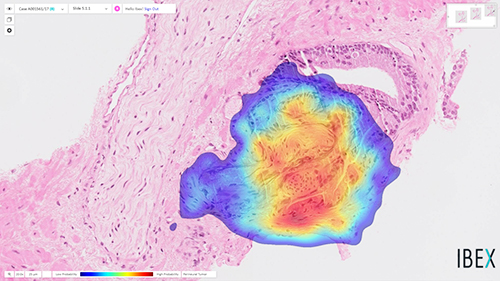Working from tissue slides similar to those used by surgical pathologists, the algorithm accurately detects prostate cancer with an impressive 98% sensitivity
It could be that a new milestone has been reached on the road to using artificial intelligence (AI) to help anatomic pathologists diagnose cancer and other diseases. A research collaboration between a major American university and an Israeli company recently published a study about the ability of an AI algorithm to correctly diagnose prostate cancer.
The collaboration involved researchers at the University of Pittsburgh Medical Center (UPMC) and at Ibex Medical Analytics of Israel. The research team created an AI algorithm dubbed the Galen Prostate (part of the Galen Platform). In the study, the Galen Prostate AI accurately detected prostate cancer with 98% sensitivity and 97% specificity.
Researchers noted that this level of diagnostic sensitivity and specificity was significantly higher, compared to previously tested cancer-detecting algorithms that utilized tissue slides. The UPMC scientists published their findings in The Lancet Digital Health, titled, “An Artificial Intelligence Algorithm for Prostate Cancer Diagnosis in Whole Slide Images of Core Needle Biopsies: A Blinded Clinical Validation and Deployment Study.”
AI Show and Tell in Anatomic Pathology
The scientists trained the Galen Prostate AI to recognize prostate cancer by having it examine images from over a million parts of stained tissue slides taken from patient biopsies. Expert pathologists labeled each image to teach the algorithm how to distinguish between healthy and abnormal tissue. The AI was then tested on 1,600 different tissue slide images that had been collected from 100 patients seen at UPMC who were suspected of having prostate cancer.
“Humans are good at recognizing anomalies, but they have their own biases or past experience,” said Rajiv Dhir, MD, Chief Pathologist and Vice Chair of Pathology at UPMC Shadyside Hospital, Professor of Biomedical Informatics at University of Pittsburgh, and senior author of the study, in a UPMC news release. “Machines are detached from the whole story. There’s definitely an element of standardizing care.”

UPMC Algorithm Goes Beyond Cancer Detection, Exceeds Human Pathologists
The researchers also noted that this is the first algorithm to extend beyond cancer detection. It reported high performance for tumor grading, sizing, and invasion of surrounding nerves—clinically important features of pathology reports.
“Algorithms like this are especially useful in lesions that are atypical,” Dhir said. “A nonspecialized person may not be able to make the correct assessment. That’s a major advantage of this kind of system.”
The algorithm also flagged six slides as potentially containing abnormal tissue that were not flagged by human pathologists. However, the researchers pointed out that this difference does not mean the AI is better than humans at detecting prostate cancer. It is probable, for example, that the pathologists simply saw enough evidence of malignancy elsewhere in the patients’ samples to recommend treatment.
Other Studies Where AI Detected Prostate Cancer
The UPMC researchers are not the first to use AI to detect prostate cancer. In February, The Lancet Oncology published a study from researchers at Radboud University Medical Center (RUMC) in the Netherlands who developed a deep learning AI system that could determine the aggressiveness of prostate cancer in certain patients.
For that research, the RUMC scientists collected 6,000 biopsies from more than 1,200 men. They then showed the biopsy images along with the original pathology reports to their AI system. Using deep learning, the AI was able to detect and grade prostate cancer according to the Gleason Grading System (aka, Gleason Score), which is used to rate prostate cancer and choose appropriate treatment options. The Gleason Score ranges from one to five and most cancers obtain a score of three or higher.
“Systems such as ours can be used in different ways. First, it can be used to screen biopsies and to filter out the easy (benign) cases. This could reduce the workload for pathologists,” said Wouter Bulten, a PhD candidate at Radboud who worked on the study, in an interview with HemOnc Today. “Second, the system can be used as a second opinion after the pathologist’s initial read. The system can flag a case if its opinion differs from that of the pathologist. It also can give feedback during the first read, showing the pathologist where to look. In this case, the pathologist needs only to confirm the opinion of the AI system.”
Can Today’s AI Outperform Human Pathologists?
In their research, the Radboud team discovered that their AI system was able to achieve pathologist-level performance and, in some cases, even performed better than human pathologists. However, they do not foresee AI replacing the need for pathologists, but rather emerging as another method to use in cancer detection and treatment.
“We see our system as an additional tool that the pathologist can use. Although our system performs very well, it still makes mistakes,” stated Bulten. “These mistakes are often different from those a human would make. We believe that when you merge the expertise of the pathologist with the second opinion of an AI system, you get the best of both worlds.”
According to the American Cancer Society, prostate cancer is the second most common cancer among men in the US, after skin cancer. The organization estimates there will be approximately 191,930 new cases of prostate cancer diagnosed and about 33,330 deaths from the disease in the US in 2020.
Though the UPMC study focused only on prostate cancer, the scientists believe their algorithm can be trained to detect other types of cancer as well. AI in clinical diagnostics is clearly progressing, however more studies will be required. Nevertheless, if AI can truly become a useful tool for anatomic pathologists to detect cancer earlier, we may see a welcomed reduction in cancer deaths.
—JP Schlingman
Related Information:
Newly Developed AI Capable of Identifying Prostate Cancer with “Near-perfect Accuracy”
Artificial Intelligence Identifies Prostate Cancer
Prostate Cancer Can Now be Diagnosed Better Using Artificial Intelligence
AI System Outperforms Pathologists in Identifying Prostate Cancer Aggressiveness



